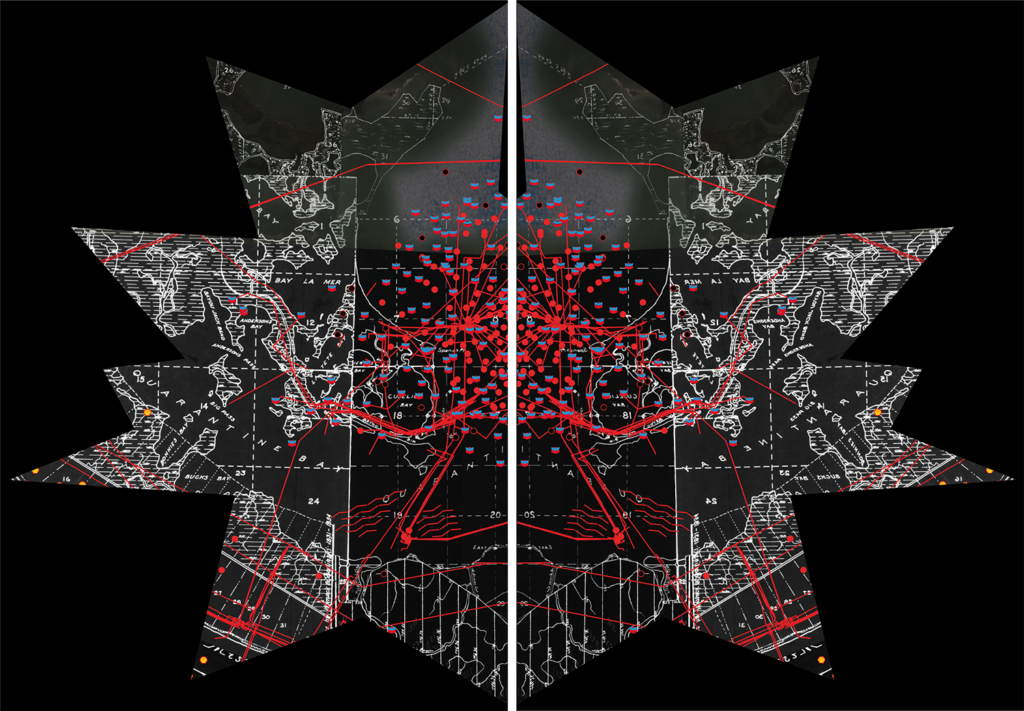Announcing MARCH 02 + Call for Contributions
March 2021

Imani Jacqueline Brown. Old Gods, 2021. Framed and reflected chart of permits for coastal development, including oil and gas wells, pipelines, and access canals in Quarantine Bay, Plaquemines Parish, Louisiana (1920-2020), mapped against antebellum Public Land Survey System (PLSS) charts (1820s-1860s). The PLSS was the first US system to plat, or divide, territory into parcels of private property.
We are pleased to announce the next issue of MARCH will be edited by Imani Jacqueline Brown, an artist, activist, and researcher from New Orleans whose work investigates the continuum of Extractivism, from settler-colonial genocide and slavery to contemporary gentrification, fossil fuel production, and police and corporate impunity. In exposing the layers of violence and resistance that comprise the foundations of US society, she opens space to imagine a path to ecological reparations. Imani is currently a researcher with Forensic Architecture and a visiting research fellow at the Center for Research Architecture, where she received her MA with distinction in 2019.
Building from her MARCH 01 contribution, “Black Ecologies: an opening, an offering,” (now available with audio online) this second edition will be a defining document toward the concept of Black Ecologies as a “resistance to extractive ecologies across the colonial-capitalist world.” Additionally, we have partnered with Dark Matter University to co-publish a series of online articles circulating around the issue to be released this fall. Subscribe now to support these endeavors and receive copies of MARCH 01 now and MARCH 02 on its release.
Black Ecologies
How do we rupture the continuum of Extractivism,
which spans from colonial genocide and slavery to climate change?
We get radical.1 We get to the root.
Africa is humanity’s root.
Through her Black diaspora, she seeds resistance to extractive ecologies
of plantations and penitentiaries.
We break down boundaries
of geopolitical borders and NIMBY delusions
that segregate humanity and hypoxify existence.
We open portals to ecological reparations.
What philosophies, forms, and practices of ecological co-existence and more-than-human kinship are carried from Africa through the circulatory web of the Black diaspora? Under what conditions—pressure and care—do they awaken from dormancy? Which practices encourage them to flourish and proliferate? How do they seed resistance to extractive systems that conquer, divide, and persist through the segregation of humanity from “nature” and Black human beings from humanity? What politics of repair and reintegration do they cultivate? In other words, what might it mean for Black people to fight for the “rights of nature” in tandem with the fight for our basic human rights?
Growing out of “Black Ecologies: an opening, an offering,” guest editor Imani Jacqueline Brown issues an urgent call for writing and visioning, actions and plots, new propositions and re-reading of existing works within the contextual embrace of Black Ecologies.
2021 Call for Contributions
We invite proposals for new or unpublished essays of approximately 2,500 words to be considered for publishing. You are welcome to send us pitches and/or drafts (including experimental writing and adaptive new forms) at any time, but proposals to be considered for MARCH 02 on Black Ecologies will be due April 15.
This project is made possible with support from The Luminary and Nordisk Kulturfond.